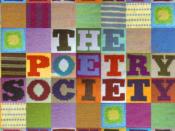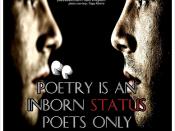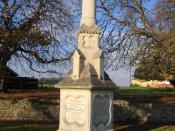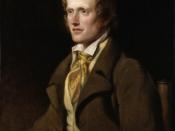This poem hit the spot. Mentally that is. Why? Well, when I first heard of the assignment I knew immediately what the poem had to convey: first love. There is nothing sweeter, more captivating than that first glance at love. It had to display the awkward feelings of love, the power of looking at each other, a poem that would describe the ye oulde 'butterflies in the stomach' but in a closer to life way. In addition, it had to pack a sort of negative outcome of first love because it is not always perfect. When I began my search I must admit I avoided any sonnet or love filled poem written by Mr. Shakespeare. He has reigned with his sceptre long enough; moreover I don't really like his sonnets. True, they are full of beautiful imagery and great metaphors but they don't have a familiar feeling. Then I found it, First Love, by John Clare. It had all the elements I wanted. Love poetry has never been my favourite type of poetry but First love has my blessing.
First impressions
After I read it for the first time I kept straying from it to personal experiences. Well, actually 'experience' because there is only one first love. I think everybody who reads this poem will have that. So the poem already has that attractive power. It lays in the familiarity of the theme and its straightforwardness and simplicity but I will get back to that (see section Form). A second attempt got me to focus on the contents. It is written from a first person view and the main character tells us without beating around the bush what he's feeling. He opens by confessing that he has never been struck like that before: he has been hit and feels disorientated. He describes the feelings of falling in love using a description of the sense.
" My face turned pale, a deadly pale ... My legs refused to walk away ..."
But although the poem appears to have this light-hearted, sweet theme, it does conclude with a rather ominous stanza, which could mean 2 things: the power of first love or the rejecting of first love.
" My heart has left its dwelling place ... And can return no more ..."
Content & imagery
The poem shows the intensity of first love and the passion we derive from it. It is like the author tells us his personal tale of when he was struck with first love. Since that day he has never been the same. The only thing we ever get to know of his love interest is the beauty of her face ("Her face it bloomed like a sweet flower .../I never saw so sweet a face"). This shows the chastise nature of the poem: remember this is a poem from the Victorian period. But it could also show the interest of the main character: the beauty of her face swept him of his feet and it was all he remembers. In the first stanza already he has already lost his heart to this beautiful face. So the poem isn't as much about the beauty of the opposite (as many sonnets are), it is more about emotional impact that beauty has for example, if she looked at him he just froze up ("My life and all seemed turned to clay"). Indeed, it 'seemed' because first love is a passing thing, it is certain form of ecstasy you settle in until it's over.
However, when she does look at him, when she does pay him attention, he chokes up and suffers, the blood rushes to the face. From this point the senses, his senses that describe the event use a lot of imagery:
"The trees and bushes round the place seemed midnight at noonday."
This creates the image of the day going suddenly dark. The use of "midnight" creates an image of blackness and not being able to see anything. He is blinded by love. All these chaotic feelings 'hit' him like the first line sums up. And his eyes spoke a thousands words at the sight of the woman whom we do not see. Still we do get as much entangled with her as the main character because of his clear-cut emotions. The silent voice she seemed to hear in the 5th stanza are the words his eyes spoke in the 4th. And then they stand there, face to face. And his heart has left his home, love has stolen it. So
"My heart has left its dwelling place ... And can return no more" refers back to
"... And stole my heart away complete"
Although the poem could have this happy end, it could conclude with the rejection of first love (see section images of nature).
On a side note I just wanted to say that this poem reminded me of a poem we did last year or the year before called La belle dame sans merci. Both poems deals with the same theme, unanswered love. Only they each tackle the topic in a different way.
Form
First Love used a non-traditional yet simple form. This might be because John Clare came from poverty and was not educated and therefore could not use a sophisticated form. He also uses a non-traditional form because his feelings are all over the place. It also uses a simple a, b, a, b rhyme scheme. This unison simplicity in combination with the directness of his emotions makes it such a powerful love poem. It is pure, and recognizable. Like Pim Fortuyn supposedly said what the people always thought but never said; John Clare shows us what we all have felt but could never describe. The simple rhyme scheme also displays a form of tranquillity: a minimalist, calm, layout in contrast with a disorientated content.
Images of Nature
The poem also uses images of nature. John Clare uses the line "are flowers the winter's choice?" Here he could be comparing his rejection by her to the coldness of winter. While many love poems choose summer as an image of an everlasting beautiful love, Clare shows us the opposite. So the poem sort of rebels against what is common: the Sonnet. It also has this sort of gradual season change going from sweet blooming flowers to full-grown overshadowing trees and bushes to finally the coldness of winter. Now the winter could mean the tranquillity of winter after the boisterous and chaotic winter. But this would again be in contrast with the rejection of the woman because the winter would represent the coldness. So it could be interpreted in 2 ways. Though I think the rejection of love is more likely looking at the questions he raises at the end ("Are flowers the winter's choice ... Is love's bed always snow"). First love is so sweet but can be so cruel. C'est la vie.






Thank You
You have a lot of good points I have missed out when looking at this, thanks :)
1 out of 1 people found this comment useful.